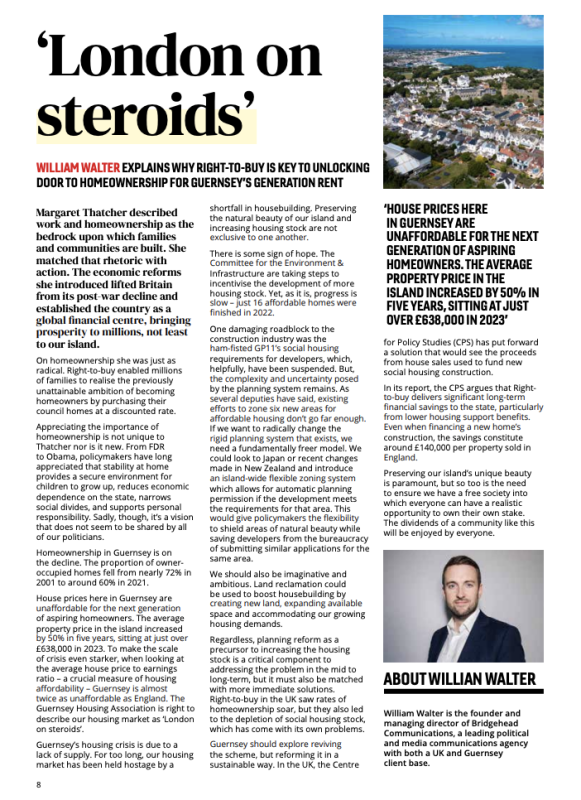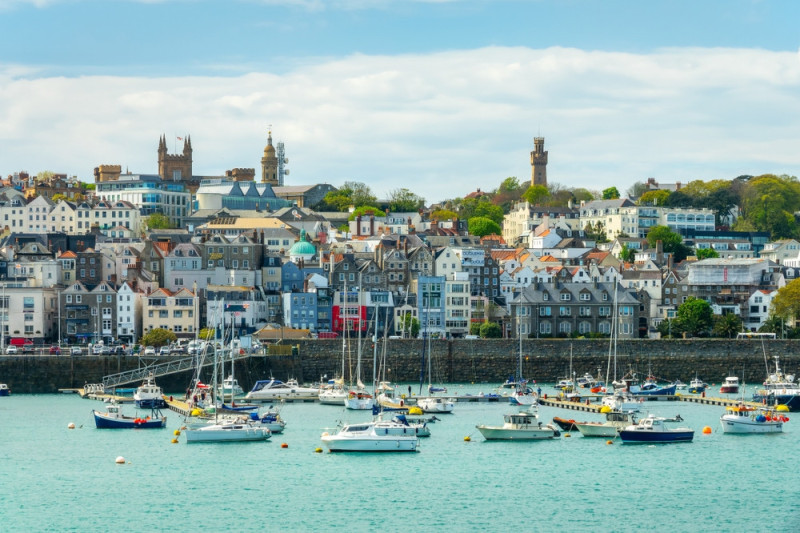Margaret Thatcher described work and homeownership as the bedrock upon which families and communities are built. She matched that rhetoric with action. The economic reforms she introduced lifted Britain from its post-war decline and established the country as a global financial centre, bringing prosperity to millions, not least to our Island.
On homeownership she was just as radical. Right-to-Buy enabled millions of families to realise the previously unattainable ambition of becoming homeowners by purchasing their council homes at a discounted rate.
We could look to Japan or recent changes made in New Zealand and introduce an island-wide flexible zoning system which allows for automatic planning permission if the development meets the requirements for that area.
Appreciating the importance of homeownership is not unique to Thatcher nor is it new. From FDR to Obama, policymakers have long appreciated that stability at home provides a secure environment for children to grow up, reduces economic dependence on the state, narrows social divides, and supports personal responsibility. Sadly, though, it's a vision that does not seem to be shared by all of our politicians.
Homeownership in Guernsey is on the decline. The proportion of owner-occupied homes fell from nearly 72 per cent in 2001 to around 60 per cent in 2021.

House prices here in Guernsey are unaffordable for the next generation of aspiring homeowners. The average property price in the Island increased by 50 per cent in five years, sitting at just over £638,000 in 2023. To make the scale of crisis even starker, when looking at the average house price to earnings ratio - a crucial measure of housing affordability - Guernsey is almost twice as unaffordable as England. The Guernsey Housing Association is right to describe our housing market as “London on steroids.”
Guernsey’s housing crisis is due to a lack of supply. For too long, our housing market has been held hostage by a shortfall in housebuilding. Preserving the natural beauty of our Island and increasing housing stock are not exclusive to one another.
There is some sign of hope. The Committee for the Environment & Infrastructure are taking steps to incentivise the development of more housing stock. Yet, as it is, progress is slow – just 16 affordable homes were finished in 2022.
One damaging roadblock to the construction industry was the ham-fisted GP11’s social housing requirements for developers, which, helpfully, have been suspended. But, the complexity and uncertainty posed by the planning system remains. As several deputies have said, existing efforts to zone six new areas for affordable housing don’t go far enough. If we want to radically change the rigid planning system that exists, we need a fundamentally freer model. We could look to Japan or recent changes made in New Zealand and introduce an island-wide flexible zoning system which allows for automatic planning permission if the development meets the requirements for that area. This would give policymakers the flexibility to shield areas of natural beauty while saving developers from the bureaucracy of submitting similar applications for the same area.
We should also be imaginative and ambitious. Land reclamation could be used to boost housebuilding by creating new land, expanding available space and accommodating our growing housing demands.
Regardless, planning reform as a precursor to increasing the housing stock is a critical component to addressing the problem in the mid to long-term, but it must also be matched with more immediate solutions. Right-to-Buy in the UK saw rates of homeownership soar, but they also led to the depletion of social housing stock, which has come with its own problems.
Guernsey should explore reviving the scheme, but reforming it in a sustainable way. In the UK, the Centre for Policy Studies (CPS) has put forward a solution that would see the proceeds from house sales used to fund new social housing construction.
In its report, the CPS argues that Right to Buy delivers significant long-term financial savings to the state, particularly from lower housing support benefits. Even when financing a new home’s construction, the savings constitute around £140,000 per property sold in England.
Preserving our Island’s unique beauty is paramount, but so too is the need to ensure we have a free society into which everyone can have a realistic opportunity to own their own stake. The dividends of a community like this will be enjoyed by everyone.



